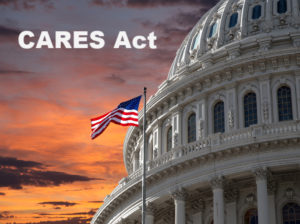 The $2 trillion coronavirus economic stimulus bill is the single largest relief legislation in U.S. history, aimed at providing help for individuals and businesses affected by the outbreak. It was signed into law on March 27, 2020. The CARES Act is also known as “Phase III,” because it follows a $104 billion package passed March 18 for workers and families, and a smaller $8 billion bill to increase funding for medical treatments and testing. There is already talk of a fourth and fifth package in development in Congress.
The $2 trillion coronavirus economic stimulus bill is the single largest relief legislation in U.S. history, aimed at providing help for individuals and businesses affected by the outbreak. It was signed into law on March 27, 2020. The CARES Act is also known as “Phase III,” because it follows a $104 billion package passed March 18 for workers and families, and a smaller $8 billion bill to increase funding for medical treatments and testing. There is already talk of a fourth and fifth package in development in Congress.
Here’s what you should know:
- Direct Payments to Taxpayers
Americans are set to receive a one-time direct deposit^ of $1,200 estimated to occur around mid-April, based on their most recent tax return on file with the IRS from 2018 or 2019^^. Joint tax filers will receive $2,400. Heads of household and joint filers with children will receive an additional $500 per child under age 17.
For individuals with incomes from $75,000 – $99,000, heads of household earning $112,500 – $146,500 and joint filers earning from $150,000 – $198,000, the payment is reduced by 5% ($50 for every $1000 in AGI), and will not be made for those earning more than that. Social Security recipients will receive their checks based on information from the Social Security Administration; they needn’t file tax returns to receive the money.
^Payments will be deposited to the last bank account used for IRS refunds and/or Social Security direct payments or mailed to the last known address. The IRS will provide a phone number for issues with payments. Mailed checks may take 20 weeks or longer.
^^NOTE: The payment is based on anticipated 2020 income. If taxpayer income in 2018 or 2019 was too high to qualify, but meets thresholds in 2020, the payment will be made in 2021. If taxpayer income in 2018 or 2019 was low enough to qualify but turns out to be higher than thresholds for 2020, the taxpayer gets to keep the payment; there will be no claw-back.
- Unemployment Benefits
Unemployment benefits for those affected by the coronavirus will be increased to an additional $600 per week for four months on top of state benefits. Temporarily through July 31, under a measure called “Pandemic Unemployment Assistance,” this will also apply to self-employed, independent contractors and gig economy workers who typically aren’t allowed to file for unemployment. Regular state unemployment benefits will be extended beyond the normal 26 weeks and will be paid by the federal government through December 31 for those eligible who remain unemployed. Employers who reduce employee hours instead of laying off workers and employees with reduced hours can also receive up to 26 weeks of pro-rated benefits.
- 401(k) / 403(b) / Traditional IRA / Qualified Retirement Plan Loans
The loan limit from qualified retirement plans for workers who contract COVID-19 or are otherwise adversely affected is doubled to $100,000 without the 10% penalty for workers under the age of 59-1/2. There is no mandated 20% withhold by the 401(k) administrator for taxes; income taxes will be due on the distribution amount spread over three years unless the taxpayer returns the money to the account over the three-year period.
- RMDs Suspended for 2020
Required Minimum Distributions are suspended for 2020 for retirees as well as heirs and/or beneficiaries; funds can stay invested without penalty. Voluntary distributions are still allowed, including tax-advantaged Qualified Charitable Distributions (QCDs).
- Student Loans / Mortgage Forbearance
Student loan payments will not be due and interest will not accrue on federal student loan debt (not private) through September 30, 2020, but voluntary payments can be made toward existing principal and interest. Temporarily through December 31, 2020, employers may pay for an employee’s student loan debt up to $5,250, excluding that amount from both the company’s income and the employee’s income, thus making it a desirable, income tax-free benefit.
Those with single family mortgages backed, insured and/or guaranteed by federal government agencies may be eligible to request 180 days of mortgage forbearance due to financial hardship as a result of COVID-19. Penalties, fees or extra interest during the forbearance period may not be assessed. This may be extended another 180 days at borrower’s request. The hardship must be documented by the loan servicer, and payments will be due later. With some forbearance programs, you may owe all of your missed payments at one time, or additional payments at the end of the mortgage might be required, so it’s important to be familiar with the final terms. If renting from an owner who has a federally backed mortgage, the CARES Act provides for a suspension or moratorium on evictions. More information here: https://www.consumerfinance.gov/about-us/blog/guide-coronavirus-mortgage-relief-options/
- Health Care Provisions
All coronavirus testing and potential vaccines for COVID-19 will be covered at no cost to patients. Health Savings Accounts (HSAs), Archer Medical Savings Accounts (MSAs), and Healthcare Flexible Spending Accounts (FSAs) are expanded permanently to include over-the-counter medications as well as menstrual care products. Medicare payments are being accelerated, and there is a 20% add-on payment for inpatient treatment as well as increased access to post-acute care. Medicaid scheduled reductions for low-income assistance are postponed through November 30, 2020. Physicians may receive increased payments if labor cost is determined to be below national average through December 1, 2020.
- Charitable Giving
Taxpayers may deduct up to $300 in charitable cash contributions to qualified charities if they don’t itemize for the 2020 tax year. On itemized returns, the limit of 60% of Adjusted Gross Income (AGI) to qualified charities is removed for the year; a maximum of 100% of AGI can erase an individual’s tax liability for 2020 and any excess can be carried forward as a charitable contribution for up to five years.
There is much, much more included in this 800-page piece of legislation. Please call us if you have questions, and we will keep you as up to date as possible as things change and clarifications come to light.
This information is provided as a courtesy and is accurate to the best of our knowledge. However, this is new legislation still being analyzed by experts. IRS clarifications will follow. Do not rely on this information or consider it as tax advice; obtain direct information about your individual situation from your CPA or tax professional.
Sources:
https://home.treasury.gov/cares
https://www.consumerfinance.gov/about-us/blog/guide-coronavirus-mortgage-relief-options/
https://www.forbes.com/sites/zackfriedman/2020/03/28/student-loans-payments-suspended/#3d8734ae1b10
https://www.benefitresource.com/blog/cares-act/
All securities offered through The Investment Center, Inc. Bedminster,NJ- Member FINRA/SIPC. Advisory Services provided through IC Advisory Services, Inc.-An SEC Registered Investment Advisor. Sylvan Financial Advisors is not affiliated with The Investment Center, Inc. or IC Advisory Services, Inc.


